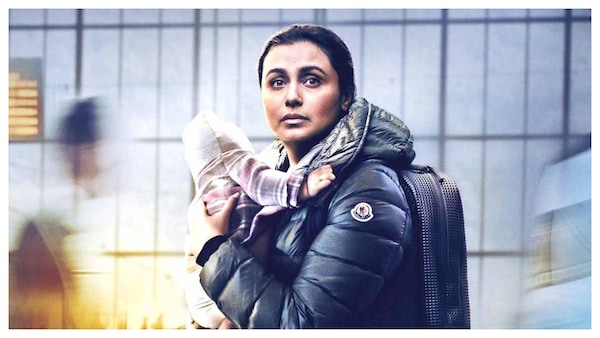Mrs. Chatterjee vs. Norway review: Rani Mukerji starrer kills the momentum of a profoundly compelling narrative that deserved much more
Ashima Chibber's film is based on a real-life incident.

Last Updated: 11.05 AM, Mar 15, 2023
The story of Mrs. Chatterjee vs. Norway is based on the book "The Journey of a Mother" by Sagarika Chakraborty, an immigrant from India whose children were taken from her in 2011 on grounds of mistreatment by the Norwegian Child Welfare Services (Barnevernet). This movie is about the woman's torturous two-year odyssey, which includes a well-publicized intervention from India's Ministry of Foreign Affairs and a legal struggle with both the Norwegian government and her husband's family. In the film, h er husband's name is Aniruddha (Anirban Bhattacharya), her name is Debika Chatterjee (Rani Mukerji), and Barnevernet has been renamed Velfred. This is a narrative packed with social conflict.
There is natural scope to investigate not merely the discriminatory flaws of 'First World' systems, but also the dysfunctionality of South Asian parenting. A movie that avoids exploring subtext makes both sides appear to be complicit in certain ways, but none is made to answer for their actions. Although there are signs of a child welfare scam, nobody is particularly aware of it. You occasionally want to support the authorities in their efforts to protect the children from erratic parents and a destructive marriage. Yet, portraying an underdog protagonist as the hero of the story by whatever means is a particularly desi quality that robs the narrative of complexity and challenging paradoxes.
The movie makes every effort to portray the entire foster care system as corrupt and malevolent. The blatantly broad strokes do scant credit to the story of a distressed lady pushed to the wall and left with little option but to battle to be reunited with her children.
The true story on which Mrs. Chatterjee vs. Norway is based. One can completely understand what the victimised mother would have gone through as she fought against a cold-blooded system determined to beat her into submission. Regrettably, the movie never feels authentic because it is far too obnoxious and blunt.
The screenplay by Sameer Satija, Ashima Chibber, and Rahul Handa is an adaptation of a published account of a Kolkata woman's encounter with the rigid child protection system in Norway. It is too chaotic to be able to fully exploit the story's intensely emotional heart.
Although Rani Mukerji is a captivating actor, her harsh, screechy performance doesn't look good for her role. It's a performance that continuously feels like a presentation. The script's mixture of Hindi, Bangla, and English dialects only serves to accentuate the uneven tone. Without actually delving into the reasons why the marriage failed, there isn't much to say about Anirban's Anirudh being cast as the evil guy.
The strenuous proceedings in Mrs. Chatterjee v. Norway are calmed down by Jim Sarbh's cool counsel. The only sobering, logical thing said in this cacophonous homage to motherhood is his wonderful ideas on adoption to an equally level-headed Balaji Gauri at the very end.
Neena Gupta makes a short and impactful appearance as an Indian minister travelling to Oslo to seal a deal with Norway.
Mrs. Chatterjee vs. Norway is a heated controversy that kills the momentum of a profoundly compelling narrative that deserved far more.
WHERE
TO WATCH
Subscribe to our newsletter for top content, delivered fast.

